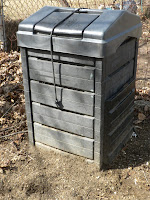A lot of people are quick to apply chemical pesticides at the first sign of trouble. Some may even use them as a preventative measure. Yet exposure to pesticides has been linked to various health problems, including cancer, birth defects, lymphoma, and ADHD and other neurological development problems in children. Plus, there is no law requiring companies to test lawn pesticides with the same standards as pesticides used on commercially-grown food. In addition to their health risks, pesticides contaminate air, water, and soil, endangering plants and animals as well.
So what’s the safer alternative to chemical pesticides? Start by planting native species whenever possible. Native plants are better suited for persevering against the weeds and pests of the local area. You can also seek out plants that attract pest-eating insects like bees and ladybugs. A few options are thyme, rosemary, parsley, mint, peonies, and daisies. Allowing carrots, broccoli, or cabbage to grow to flower also helps attract predator insects.
If pest insects are still a problem, there are a variety of natural repellents that can deter them before they have a chance to get comfortable. Natural repellents that use either a citrus oil, pepper, or garlic base are safe to use and very effective.
When it comes to weeds, the best way to avoid them is to provide your plants with optimal soil conditions. Make sure to aerate soil before planting. A great alternative to laying plastic down around plants to block weeds is to use newspaper. It is organic, can be turned into the soil the following spring, and is less expensive than plastic. For an all natural and safe pre-emergent weed killer try corn gluten meal. It has been shown to inhibit the growth of dandelions, crabgrass, and several other annual weeds.
Any weeds that make it past your initial lines of defense can be taken care of by hand or with a hoe or spade. While you’re at it, prune those plants (always back to the main branch) to keep them strong. If you can’t bend down or simply don’t feel like it, invest in one of the many tools available for removing weeds by their roots. If you still feel like you need to apply a weed killer, seek out an organic herbicide.
How you mow your lawn can have a major impact on its health. By mulch-cutting and leaving the clippings on the lawn you provide a great source of nitrogen to your grass. Also, cutting high is very beneficial. A lot of weeds are simply choked out and the lawn’s root system develops to become more drought-resistant and hardy. Finally, by keeping your lawn mower blade sharp you make clean cuts leaving fewer openings for disease and insect infestations.
When it comes to feeding your lawn and garden, nothing is better than the all natural fertilizer you create by composting. Combining organic waste like yard clippings, food scraps, and dry leaves in a compost bin creates an organic fertilizer that enriches soil, suppresses plant disease and pests, promotes plant production, and helps soil retain moisture. Compost has even been proven to revitalize contaminated soil. It absorbs VOCs, pesticides, and other chemicals, preventing them from migrating to water resources or being absorbed by plants. Composting keeps waste out of landfills and can reduce the need for water, fertilizers, and pesticides. It is also less expensive than commercial fertilizer.
When it comes to watering your plants, you may want to consider a rain barrel. A rain barrel is a container designed to capture and store rainwater coming off a roof, usually attached to a downspout. Using rain barrel water to water your lawn and garden and even wash your car will reduce your water bill and reduce the amount of pollutants pouring into local storm water systems. Plants grow better with natural water compared to water treated with chlorine and fluoride. Plus, drinking water is a precious commodity. By using rain barrels, you'll be conserving it instead of dumping it on your yard. The water required to produce just 1 cup of coffee can fill one 50 gallon rain barrel. Rain barrels can be homemade or purchased pre-assembled or as a kit for $50 to $200.
With some careful planning and a little hard work anyone can grow a successful, organic lawn and garden. May the warm weather be with you!

Compost bin from local DPW.

Hand-me-down compost bin.

Homemade rain barrel.
No comments:
Post a Comment
Note: Only a member of this blog may post a comment.